
- Originally Published on August 7, 2020
How to Secure a Court Order to Remove Content From the Internet
Many clients come to us feeling frustrated that a website or search engine is refusing to remove defamatory or damaging online content. Sometimes the negative content is a fake Google review, sometimes it is a false post on a public shaming website, other times it is a negative news article riddled with inaccuracies and defamatory statements.
After helping our clients successfully remove hundreds of thousands of pieces of negative online content over the years, we have seen nearly every form of damaging online content and know the best ways to approach and achieve removal.
The question many clients ask when they contact us is whether (and how) they can force an individual, website, or search engine to remove online content. Especially when many of these websites, including search engines, are immune from liability under the law. The simple answer is often that they need to obtain a court order. However, like many legal questions, whether a client should go through the process of obtaining a court order to resolve their situation depends on many factors.
The decision of whether to pursue litigation to get a court order is a serious one that should always be considered carefully. There are many benefits and risks to lawsuits that need to be taken into account. Using a court order to address online content is a powerful tool that can help clients accomplish their goals. However, it is not a panacea to every online problem and will not always be necessary or the most appropriate way to resolve every situation. It is important for clients to consider all options and litigation alternatives.
In situations where obtaining a court order is an appropriate course of action, following these simple steps is the surest way to get a court order to remove content from the internet:
- Determine whether you need a court order and its necessary to get the content removed;
- Identify the author of the online content and notify them that the content is unlawful and should be taken down;
- File a lawsuit against the author of the damaging content;
- Establish a legal basis for removal and win your lawsuit; and
- Draft a court order with appropriate language and have it granted by the court.
In this comprehensive article, we will also explain::
- What a court order is and when you should seek one,
- Pros and cons of court orders,
- Best practices for obtaining a court order,
- How to enforce your court order, and
- Common alternatives to court orders for removing damaging online content.
We will start with a brief overview of court orders and why they may not be useful or necessary in every case.
With a team of experienced attorneys, we will fight for the closure you deserve. Take back control today.Don't suffer in silence.
What is a Court Order & When Do I Need One?
The reality of today’s digital landscape is that people frequently formulate their first (and sometimes only) opinion of you or your business based on what your digital footprint tells them. Just as a positive digital footprint can uplift your social life and standing in the community, or your business’s bottom-line, a negative digital footprint or defamatory piece of information can derail it just as quickly.
There is no denying that the internet can be a hostile place. A plethora of internet websites exist and are dedicated solely to defaming, online shaming, and attacking individuals and businesses. Prime examples are websites such as TheDirty.com, RipoffReport.com, ShesaHomewrecker.com, and PissedConsumer. There are however thousands of others who have also established themselves as go-to places to carry out these acts of sabotage to reputations.
What is more, these websites dedicated to defaming people and tearing businesses down are largely protected by the federally enacted internet law known as Section 230 of the Communications Decency Act (CDA). Section 230 of the CDA was drafted with modern-day search engines and websites in mind, establishing a near-blanket immunity for platforms that display content posted by third-parties.
As a result, many search engines and websites have policies in place preventing the removal of content by anyone and under any circumstance, regardless of the truthfulness of the content or damage caused. Sometimes, websites may agree to remove content for a one-time or monthly fee, or with the brokering of its removal through a costly third-party arbitration service.
Understandably, this has generated intense frustration and stress for individuals and businesses that have been unfairly defamed or attacked on these sites.
However, in cases where a platform or author is unwilling or unable to remove damaging online content, an injured party may seek a court order to secure its removal.
What is a Court Order? Court Order Definition
Court orders are an official proclamation issued by a judge or court directing a person or business to either undertake an action or refrain from performing a particular action. Court orders may be issued as a final order at the conclusion of a legal action or an interim order during a legal action.
Court orders can be broken down into four fundamental types:
- Stipulated: an order where two parties consent;
- Default: an order issued when the defendant does not show up;
- Dispositive Motions: orders won off motions like summary judgment; and
- Injunctions: orders won by temporary and preliminary injunctions for expedited relief.
Most court orders are written and signed by a judge, but may also come in a verbal form that is subsequently reduced to writing in a proceeding’s transcripts.
Depending on the matter at hand, the substance and provisions of a court order may vary greatly. However, common matters that are typically addressed in the terms of a court order include: divorce decrees, restraining orders, child custody, protective orders, criminal sentences, and online content removal.
For example, a court order could address something as simple as mandating a party to attend a trial or court date. Or, a court order could address something as complex as the complete restructuring and enforcement of contractual provisions between tech companies in a multi-jurisdictional dispute. It can also declare a winner or loser of a party’s legal claims or lawsuit.
So, what are the main reasons why we seek court ordered removals to take down online content, comments, and posts?
Do I Need a Court Order to Remove Content From the internet?
There are many reasons as to why a person would need to remove certain content from the internet. In some cases, a personal disagreement may escalate to the point where one party decides that it would be a good idea to spread lies, falsehoods, and other untrue information online.
In other circumstances, an individual may be the victim of online harassment. For example, by drawing the ire of a group of internet vigilantes who decide to “dox” the individual by publishing an array of personal and potentially protecting information online. This information can include the target’s:
- Name,
- Address, Social Security number,
- Financial account numbers,
- Medical records,
- Place of employment, and
- Other personal details.
In other scenarios, a youthful or momentary indiscretion may have resulted in the publication of news, media, statements, images, or other materials that are compromising or cast the individual in an unfavorable light.
While most of the time, victims of damaging online content (and their lawyers), such as defamatory attacks and libelous posts, can confront (or sue) an author who published unlawful content and have them access the website and take down the content with relative ease, this is not always the case.
User-generated content platforms and websites (UGCs), often enable users and posters to comment and post anonymously, so identifying a malicious poster/troll can be extremely difficult. This often results in an extremely complex process to identify the anonymous poster and ultimately remove the online content in question.
Additionally, in some situations authors of damaging and unlawful online content can forget their logins or passwords, and no longer have access to an account to be able to remove content that they published. Other times websites have policies that do not allow for removal by the original author, require a court order to remove the content, or have a no removal policy.
When these types of circumstances are present, Court ordered online content removals are required when a person has no other options for removal. Specifically, they should be sought in the following instances:
- When a victim is unable to remove the content themselves,
- When the author of unlawful and damaging online content refuses to remove the content voluntarily,
- When the author who published the online cannot be identified and their is no other way to take the content down,
- When the website or ISP in question refuses to remove content and the author of the content also cannot remove it (search engine de-indexing),
- When the website or ISP in question explicitly requires a court order to remove content, and
- When circumstances dictate it is the most efficient and effective way to stop the continued publication or republication of unwanted content.
Pros & Cons of Obtaining a Court Order to Remove Online Content
Court orders are extremely effective tools that a lot of internet companies, websites, and search engines voluntarily respect and follow. Most companies, websites, and search engines actually have policies in place acknowledging their legitimacy. However, obtaining court orders do have risks and other cons that must be carefully considered..
Both the pros and cons of seeking a court order should be thoroughly weighed.
Pros of Court Orders
Court orders are nearly recognized by everyone as being legitimate and trustworthy. They are considered the “final stamp of authority” which recognizes the “actual evidence” of a specific online and legal violation. The pros of seeking a court order to remove online content include:
- They are broadly accepted and followed by most internet service providers;
- There is no limit to the types of claims that can be brought to obtain the court order;
- It can directly confront and eliminate the problem at its source;
- Can de-index content from search results when it cannot be removed at its source;
- Can be used to take down and transfer entire domains;
- Can award monetary relief;
- Can prevent future harm; and
- It provides ultimate vindication of your reputation.
Court Orders Are Accepted By Most Internet Service Providers
While websites, search engines, and companies are not legally obligated to honor court orders, most have policies in place acknowledging their authority and will voluntarily honor them. Unfortunately, the digital landscape for websites, search engines, and companies honoring court ordered removals is ever-changing and fickle.
Because of this uncertain digital landscape, it is imperative that you speak with an experienced internet attorney to maximize your chances of securing a court order that will be honored if you plan on obtaining one.
There is No Limit to the Types of Claims That Can Be Brought to Obtain a Court Order
Injured parties seeking to remove online content with a court order are not restricted to arguing just one legal claim, like defamation, to obtain relief. For example, an injured party seeking a court order might argue that a damaging piece of online content is defamatory, infringes a copyright, violates criminal law, or is part of a broader breach of contract action involving the parties. For a full picture of the most common alternative claims available to defamation victims, we recommend checking out our resource on the subject, “What Other Claims are Available if Suing For Defamation Isn’t an Option?”
Ultimately, relief by court order can be obtained through orders obtained by default, stipulation, or a contest judgment. So there is no limit to the types or strategy behind the claims that can be brought when seeking a court order.
To obtain appropriate relief an injured party is precluded from arguing any type of claim that can get them to their ultimate goal. This makes court orders a very flexible tool that increases the chances of successfully removing damaging content.
Court Orders Confront the Problem at its Source
Court orders confront the problem at its source, meaning that injured parties must directly confront the perpetrating party to stop their unlawful behavior. When the problem is finally solved under these circumstances, there is complete resolution.
When content is removed from the internet websites without directly notifying or confronting the person who published the content of their improper conduct, this can leave open the possibility that the person will simply just re-publish the content again.
Unmasking and confronting a perpetrator directly addresses this risk and ensures that the person will permanently cease from engaging in future unlawful and harassing online behavior.
Court Orders Can De-Index Content From internet Search Results
Court ordered content removals can lead to the de-indexing of damaging, unlawful, and unwanted content from internet search results. This is helpful in situations where content cannot be removed from a website directly.
De-indexing a web-page removes it completely from internet search results, so that a search engine’s “crawler” does not detect it, index it, and subsequently return it as a result to an internet searcher’s query.
Although not as good as complete removal of the content at the source, it is the next best thing and great remedy if completely removing content from a website itself is not an available option.
Court Orders Can Be Used to Take Down & Transfer Entire Website Domains
If a website domain is created and used to post unlawful content and harm your reputation, it is possible to direct your court order to the registrar where that domain was registered to have them transfer control of the entire domain to you. Generally speaking, domain registrar companies (GoDaddy, NameCheap, BlueHost) have policies that they will cooperate with court orders of this nature.
For example, if John Smith gets divorced and his ex-wife buys the domain <johnsmithwifebeater.com> to publish defamatory and unflattering things, John Smith can obtain a court order to either take down the website, eliminate it from search results, or transfer the entire domain to himself and remove the damaging content himself.
In the 2010 case of Office Depot Inc. v. Zuccarini, DS Holdings LLC, the assignee appellee, sought to collect a judgment on hundreds of domains owned by the defendant, Zuccarini. The transfer of the domains generated significant discussion about:
- Whether domains are in fact subject to execution of a judgment, and
- Where domains are located for purposes of execution.
Ultimately, the court held that domain names were subject to execution of a judgment and located both where the domain registrar and registry were for purposes of execution.
Related: If someone registered you or your business’s name as a domain name, you have three primary options available to try and acquire the domain. Read our article, “Someone Registered My Name as a Domain Name: What Are My Options?” to find out more.
Court Orders Can Reward Monetary Relief
Court orders do not only grant equitable relief to an injured party, but can also reward monetary relief as well.
Monetary relief is a form of compensation awarded to an injured party that commonly takes the form of provable damages, attorneys’ fees, lost profits and wages, punitive damages, and other damages attributable to the harm suffered.
Court Orders Can Prevent Future Harm & Damaging Content
Not only does a court order direct persons and websites to undertake specific actions to deal with present problems, it can also order perpetrators to refrain from engaging in future unlawful behavior, such as further publication of defamatory content or harassment.
Knowing that a perpetrator is legally prohibited from repeating their unlawful behavior gives injured parties peace of mind moving forward.
Court Orders Can Vindicate Your Reputation
A successful court order may vindicate an injured party’s reputation by providing a public record and judgment that acknowledges a harm or violation occurred.
Court orders make it known to everyone, including the injured party, defendant, and general public that the damage was (a) caused by the defendant, and (b) wrongful in the eyes of the law. It is the ultimate victory that can never be taken away that you were right and they were wrong.
Cons of Court Orders
While court orders can be effective tools for removing online content, they are not a panacea for resolving all matters involving damaging online content. Several cons of seeking a court order to remove damaging and negative content include:
- Not all websites remove content when they receive a court order and may have policies that limit their effectiveness or enforcement;
- Can be cost prohibitive and take too long to get;
- You are not guaranteed to get one. You have to win a lawsuit.
- May not cure the problem if you do not identify or directly confront the defendant;
- The risk of drawing unwanted attention and causing the Streisand Effect, making the defamatory matter a public record; and
- You have to notify and confront the antagonist.
Not All Search Engines & Websites Honor Court Orders
Unfortunately, not all search engines and websites honor valid court orders. For example, Google’s honoring of court ordered content removals has changed over the past five years and is highly dependent on the legal issue at hand. Google still accepts court orders to de-index defamatory content from its search results, but it is more stringent and discerning about what it removes than it used to be.
Some legal experts suspect Google’s changing policies regarding court orders stems from increased content removal requests by authoritarian regimes and governments and a rise in unethical reputation management agencies abusing the removal process for profit.
In today’s dynamic online content removal landscape, it is imperative therefore that you work with an experienced internet lawyer to ensure that you tick all of the necessary boxes before seeking a court ordered removal and presenting it to search engines and websites to ensure success.
Court Orders Can Be Cost Prohibitive & Take Too Long
Filing a lawsuit to obtain a court order takes a lot of work. There are numerous costs, fees, and filings required to commence a lawsuit, such as:
- Initial intake, investigations, and pre-lawsuit due diligence;
- Research and drafting the complaint;
- Court costs and filing fees;
- Process server and service costs;
- Local counsel fees;
- Pre-lawsuit communications and demand letters; and
- Subpoena fees and costs (especially in John Doe lawsuits).
Lawsuit costs are also significantly influenced by whether a case is contested or uncontested, meaning whether there is an opponent on the other side of your case fighting back or not. While the above list is far from exhaustive, it provides a sound snippet into some of the key costs necessary to file a lawsuit.
Litigation is also time intensive. One of the most influential factors that drives the total length of a lawsuit is whether it is contested or uncontested. For example, the average uncontested case at Minc Law typically takes anywhere from six to seven months. On the other hand, contested cases can take a significantly longer amount of time and the total time it takes to litigate can be difficult to predict.
To find out more about the costs associated with filing a defamation lawsuit, we recommend checking out our article “How Much Does a Defamation Lawsuit Cost?” or watching the video below.
Video: How Much Does a Defamation Lawsuit Cost? Cost to Sue for Defamation

Obtaining a Court Order is Not Guaranteed
While most search engines, websites, and internet companies have policies in place acknowledging the authority of a court order and will generally voluntarily honor them, there is no guarantee that a court of law will even issue a court order in the first place. You do have to win your case or come to some sort of stipulated agreement approved by a court to be able to get one.
Securing a court order requires an injured party to successfully prove all the requisite elements of their legal claim(s), and will not be granted should they fail to do so.
Court Orders May Not Always Fix the Problem
Obtaining a court order is not always a cure-all for damaging online content and internet attacks. It is rare. However, sometimes some problems are so extreme and circumstances are so unique that even a properly obtained order that confronts an author still will not resolve the issue.
For example, one jewelry company CEO, Michael Arnstein, was attacked and defamed online by former website developers based in India. The perpetrators launched a barrage of click-fraud attacks and reputation smearing campaigns on popular review websites. Arnstein secured several valid court orders to remove defamatory content from specific URLs, however, the attacks and defamatory postings continued.
Arnstein enlisted the help of the FBI and did everything he could to enforce the court orders, but this was ultimately unsuccessful.
Court Orders Can Draw Unwanted Attention to Your Matter
Damaging internet content and online defamation are highly sensitive issues that most injured parties do not want broadcasted to the entire world. Seeking a court order to remove or suppress damaging content and online defamation could have adverse effects by making the matter a public record and drawing unwanted attention to your internet issue. This phenomenon is also referred to as the Streisand Effect.
Video: What is the Streisand Effect & How Can I Avoid It?

The Streisand Effect occurs when an attempt to suppress private information does the opposite by drawing viral attention to a matter so that a lawsuit and court order’s intended goals are rendered obsolete because the complete removal of the damaging content is now impossible (or near impossible). Increased attention and/or the Streisand Effect does not happen in most cases.
Experienced content removal lawyers take proper measures to minimize this risk from happening when a case is filed. However, it is always a small risk that must always be considered.
Court Orders Require You to Notify & Confront the Antagonist
To obtain a court order, injured parties are generally required to take reasonable steps to notify and confront the antagonist behind the damaging online content. Confronting a perpetrator can be both complicated and daunting.
Further, poking the proverbial bear may ultimately be a detrimental course of action that can outweigh the benefits. Every situation is unique and must be weighed/judged accordingly.
How to Get a Court Order to Remove Content From the Internet
If you determine that a court order is necessary and appropriate, there are some important steps to take to ensure a positive outcome. Not all court orders are created equal – and platforms do not always have to follow orders that were not properly obtained or drafted.
The five most important things to remember when obtaining a court order are to:
- Make sure you need a court order and determining what your legal claims are and who to sue;
- Provide notice to the author of the content,
- File a lawsuit against the author;
- Win your case; and
- Draft a comprehensive court order.
Determine Whether You Need a Court Order, What Your Legal Claims Are & Who to Sue
Many platforms accept or require a court order before they will remove unwanted content posted to their platform, but not always. So it is important to ensure this is the case before pursuing one. Obtaining a court order requires litigation which can be expensive, so it is not something to jump into before doing your homework.
With numerous defenses and filing formalities associated with internet and defamation law, it is first important to analyze whether you even have (or still have) a valid legal claim against a person or company.
Below are just a list of some of the potential claims your experienced internet attorney should work through to determine whether you have an actionable claim:
- Libel;
- Defamation;
- Invasion of privacy;
- Tortious interference;
- Unfair trade practices, and
- Copyright or trademark infringement (IP claims).
In some cases, court orders may be unnecessary or ineffective (like if the author lives in a different country). More often than not though, court orders should be a measure of last resort, after pursuing simpler alternatives.
There are a few factors which will determine whether a court order is necessary:
- The type of content you are dealing with;
- Where the content is posted;
- Who posted the content.
Defamation Law Fact: There are certain types of statements considered so inherently defamatory that a plaintiff will not need to prove actual damage to the reputation. This is known as defamation per se. Most states recognize the following four types of statements as defamation per se: (1) statements charging the plaintiff with committing a crime; (2) statements imputing unchastity; (3) statement implying the plaintiff has a loathsome disease; and (4) statements which injure a person in the course of their business, work, or trade.
What Kind of Content Are You Dealing With?
Removing damaging and unlawful content almost always requires a court order, but some forms of content can be removed without an order. Content that violates the Digital Millennium Copyright Act can often be removed by filing a DMCA takedown request to the hosting website.
Google also permits users to submit requests for removal of revenge porn site submissions without the need for a court order.
In some cases, malware or phishing content, as well as harassing content, can be removed without a court order as long as it violates a website’s Terms and Conditions.
Revenge Porn Fact: Due to its extremely invasive and illegal nature, most search engines and platforms will honor requests to remove sexually explicit images posted without their consent. You can contact search engines like Google to request removal of nonconsensual pornography without the need for a court order. If you are the victim of nonconsensual pornography, read our article “What to Do If Someone is Distributing Your Intimate Images Without Consent“. The article details your options for having the content removed, with our without retaining a revenge porn lawyer.
Where is the Content Posted?
Different platforms have different rules determining when and how they will remove content. You could be dealing with content that was posted to a review site like Google or Yelp, an independent website, or a post on social media (ex. Facebook or Twitter). Each platform has its own unique set of rules that will determine whether a court order will be successful in removing the content.
Of course, most of their rules also revolve around the type of content you are dealing with. As you might imagine, most sites like Google, Facebook, and Twitter will remove content like revenge porn for violating their Terms and Conditions.
Video: What to Do If You Are Being Slandered or Libeled on Facebook

Other sites (particularly those that were designed to host illegal content) might need a court order before they will remove the content.
Do You Know Who Posted The Content?
Finally, it matters who posted the content. If the poster is anonymous, you may need to get a court order just to reveal their identity and hold the author accountable, whether a court order is ultimately necessary for removal or not.
Additionally, not every piece of content is legally actionable and can be removed through litigation. For example, if content is published by a news publication, it may be especially difficult to remove. News media have significant legal protections and defenses to defamation, so content they publish is rarely removed by a court order.
Knowing who posted the damaging content can help avoid the need to get a court order. If you know the individual personally, your defamation attorney may be able to serve them with a cease and desist letter or negotiate with them to remove the content voluntarily without litigation.
File a Lawsuit Against the Author
Obtaining a court order to remove online content requires that an injured party file a lawsuit against the author behind the content. When bringing a lawsuit against a malicious individual poster or troll, the overall goal is to obtain an equitable order from the court – or a stipulated court approved settlement – requiring the removal of a website, its contents, or the delisting of the URL from search engine indices.
To bring a lawsuit, you must have a valid claim. For example, some people looking to commence a libel or slander action are unaware that truth is an absolute defense to defamation – meaning that if the allegedly defamatory statement in question is true, then defamation cannot exist.
While the truth may hurt, it does not mean it should be censored. Furthermore, the opinion defense is also a common defense to defamation actions, and will arise in cases where the statement in question may not be proved true or false, or otherwise verified by fact.
Make sure to check out our complete guide to defamation find read up on the most common defenses to defamation that plaintiffs should consider before filing a defamation lawsuit.
Finally, even if you have a valid legal claim (such as a libel or defamation claim), there is a chance you might not be able to identify the malicious poster or individual, or they may be located in another country, so it might not be financially prudent to go after them.
The point is, you should always first consult an experienced internet removal lawyer to assist you in determining the best course of action.
Provide Notice to the Offending Party
Before obtaining a court order, after filing your lawsuit, it is critical to make reasonable attempts to notify the author of the content that it is unlawful, you want it removed, and of the intent to seek or already pending case. If you do not know the person’s identity, this might be as simple as leaving a brief comment after the review, post, or message.
It is also wise to write a letter to the website host, platform, or domain name registrar describing the damaging content and your desire to have it removed and ask them to forward it to their customer.
Ideally, defendants should be formally served and given notice of the lawsuit. Due process exists at the very heart of our legal system, so it is important you do not tip the scales of equity too far to one side (from the beginning).
If a defendant is never formally made aware of a lawsuit, then it is possible that parties who you request to comply with the order later choose not to, or it could be overturned later by the defendant by arguing that it was not properly obtained.
Negative Google Review Tip: We usually tell our clients that responding to a negative Google review directly on the online platform where it was left is usually not a good idea. Responding directly could wind up doing more harm than good, drawing more attention to the negative review and potentially encouraging other customers to air their grievances online as well. Also, responding to the review may decrease the chances that the website will remove the review for a terms of service violation.
Identification of an Anonymous Poster
If the poster is anonymous, you must make attempts to identify the author and document all the steps you took to uncover their true identity. This might include sending subpoenas to the platform or host requesting the identity of a certain username.
Ultimately, courts, and platforms, will want to see that you exhausted your efforts attempting to identify the anonymous poster and did everything within your power to provide them with notice of the litigation.
Win Your Lawsuit
To obtain a court order to remove online content, you must win your lawsuit.
Winning a lawsuit involves much more than just putting pen to paper. It requires you and your attorney to follow numerous important filing requirements, pleading considerations, and strategy decisions to win, such as:
- Providing proper notice to the offending party;
- Drafting a legal complaint with considerations in mind;
- Exploring alternative legal claims;
- Determining the correct and most beneficial legal jurisdiction to file your lawsuit in;
- Proving the elements of your legal claim and damages; and
Avoiding the Streisand Effect.
Proving the Elements of Your Legal Claim
At the heart of winning your lawsuit is successfully prove all the requisite elements of your legal claim. For example, in most states, for a plaintiff to succeed in their claim against a speaker of a defamatory statement, they must prove that:
- There is a false statement(s) purporting to be fact;
- The false statement was published or communicated by the defendant;
- The statement identifies the plaintiff;
- If the plaintiff is a private figure, that the defendant acted with ordinary negligence when publishing the untrue statement;
- If the plaintiff is a public figure, that the defendant acted with actual malice or reckless disregard when publishing the untrue statement;
- The plaintiff suffered reputational and/or economic harm as a result of the untrue statement.
Winning your lawsuit is not the only thing you have to be concerned about. Even if it appears you are going to prevail, drafting a comprehensive and effective court order to present to search engines, websites, and internet companies to get proper relief is crucial.
If your order is not effectively drafted and does not contain necessary language and requests for relief, it will not be honored by websites, search engines, and other third parties.
Draft an Effective Court Order
Judges rarely draft their own court orders when it comes to removing online content. It is often the plaintiff’s attorney who is responsible for drafting a proposed court order before it is signed by a judge. As experienced internet attorneys, we know that drafting an effective order is both an art and a science.
Here are our primary tips for drafting a court order that will be honored by third parties to effectively remove online content:
- Specifically, identify the content you want to be removed or labeled as unlawful or defamatory;
- Identify the correct URL, platform, and website where the content is published;
- Indicate that all similar content, whether published elsewhere or in a similar form, is also to be covered by the order to prevent reposting;
- Include platform-specific language to ensure the hosting platform will honor the order.
Establish That the Content Is Unlawful
Court orders will only be granted if there is a sufficient legal basis for the order. For example, to obtain a court order to remove defamatory content, you will need to prove a prima facie case. Prima facie is a legal term of art that simply means you can prove that the content meets the minimum requirements for defamation.
To establish the defamatory nature of the content, you will need to present viable, persuasive evidence that the content is false and capable of reputational harm. This evidence can be presented via tangible evidence, such as financial records to show damages, documents proving statements are false, and affidavits from witnesses.
Fake Online Review Tip: There are four primary ways to spot a fake online review: (1) compare the username and complaints against business records; (2) research the reviewer’s account activity; (3) analyze the language of the review; and (4) examine the timing of the reviews.
How to Locate & Correct Identify Content for Court Ordered Removal
After locating and classifying the unlawful URLs or content, your internet attorney will submit information via Google’s Legal Removal Requests web page. Google will seldom entertain a content removal request which lacks a valid court order, so going through a proper and legal channel is important for increasing your chances of a successful takedown.
Sometimes, locating the proper URL or URLs, which are host to the unlawful and defamatory content, can be tricky to properly identify. When requesting a URL or website removal from Google, you need to make sure you have provided Google, or your content removal attorney, with the exact URL that appears in the search results, otherwise the removal process could be delayed or even dismissed.
Google Support lists the differences between www.example.com/dragon versus www.example.com/Dragon as an often overlooked, yet crucial difference. The capitalization of the second URL can point users to completely different content from the first.
The slightest differences in a dash, slash, space, or letter between what is in your order and what is actually online and requested to be removed can make or break your request.
Forgetting to add all the way the content is visible or can be accessed is also critical to making sure your efforts are not futile.
To locate the correct URL:
- Look for the blue link: Hover your mouse over the blue link in the Google search results. Steer clear of clicking the text displayed in the link and copying the URL from the opened page.
- Right-click: Right-click and “Copy Link Address.”
- Search for additional URLs: Due to the connectivity of the internet, if the content is posted on one website, it is likely posted elsewhere. Google yourself to locate the other URLs that point to the same page of defamatory or false content.
- Double-check: If you have submitted a content removal request, but the content still appears in Google’s search results, double-check the URL you submitted matches the URL appearing in the search results. does not forget, capitalization matters.
To locate the URLs for images:
- Go to Google’s image search results,
- Locate the offensive and false image,
- Right-click to “view original image,” or “full size”
- Copy the link address.
Indicate All Similar Content is Covered Under the Court Order
When seeking a court ordered removal, it is critical to consider the possibility of republication of the unlawful or damaging content at issue or the future publication of new, online content by the perpetrating party.
Your court order should address the limitations of court ordered relief and include comprehensive language protecting against republication of the offensive content and the publication of similar content.
For example, there are serious flaws in most internet search engine’s page removal systems, which allow savvy websites and platforms to skirt completely removing unlawful content by slightly altering the content or URL. Since a URL is used as a page ID, webmasters retain the ability to create a new page ID for de-indexed pages and content.
A comprehensive court order should include language covering these potential URL alterations to prevent having to obtain a new court order every time a new URL with the same content reappears.
Include Platform Specific Language
To maximize your chances of having a website or online platform honor your court order, it is important to take note of and include any specific language required by their content removal policy. Some platforms require specific language or concerns to be addressed in the court order document itself to voluntarily comply.
It is best practice to reach out to a website beforehand to confirm what, if any, requirements they have to make sure your order complies. Although this is not always possible, and not all providers are specific as to what their requirements are.
Remember, court orders do not guarantee removal from a search engine or website, so it is critical to do everything in your power to placate them.
How to Enforce a Court Order
Assuming you are successful in obtaining a court order (congratulations!), following up with the defendant is the next step. As long as the defendant can edit or delete the content from the platform, they are required to remove it. It is that simple.
If a defendant refuses to follow a court order and does not remove the content, they can be held in contempt of court. Contempt of court can sometimes lead to jail time for a defendant – a pretty powerful motivator.
Court orders do not magically remove content from the online platform the second they are signed. Once you receive an order you may also need to submit the order to the proper entity and department within that entity to get content removed.
For instance, most popular platforms have a specific department where you will need to send a copy of the court order and a content removal request.
With your removal request, you will want to reiterate all the steps you took to notify the author of the content as well as how you obtained the court order. Some platforms even require that you add special language in your removal request before it will be honored.
If the defendant does not comply, or you do not know who they are, you must go to the platforms to submit the court order directly.
This is where an experienced content removal attorney can help ensure you are submitting the most effective form of removal request.
Work With the Platform(s) Directly
If you are faced with an uncooperative defendant or someone who cannot remove the unlawful content, you can usually still work with the platform that hosted the content to get it removed. Major online platforms such as Blogger, WordPress, Facebook, YouTube, and Google, voluntarily cooperate with court orders directed at its users.
Many of their policies prohibit users from posting content that is libelous, illegal, or infringes on the rights of others. They typically accept court orders as evidence that an internet user has violated their Terms and Conditions and work with a plaintiff to see that the content is removed.
De-index Content From internet Search Results
If all else fails, you may be able to submit a court order to search engines to have the content de-indexed from search results. This should only be a last-ditch effort, though.
De-indexing is not quite the same as content removal. The negative content will still appear on the website where it was originally posted but will not appear in search results. For many clients, this result is basically as good as removal – because people searching for your name will not see the negative content in search results.
When a search result is de-indexed pursuant to a court order, there is usually a legal notice posted at the bottom of the search results page indicating content was removed. While users can click on the link to get more information (like the name of your attorney), search engines usually do not immediately identify the content or that you made the request without further follow-up communications and requests.
Only the most curious of onlookers will go through the trouble of clicking on links that do not mention you – and they will not find anything more than a form and process to request more information when they do.
Below are two simple walkthroughs of how to report content to both Google and Bing after securing a court ordered removal via their content removal submission forms.
Google Content Removal Submission Form Walkthrough
Step 1: First, you will need to select the Google product your court order relates to. Most court ordered content removals will relate to Google Search or Google Images.
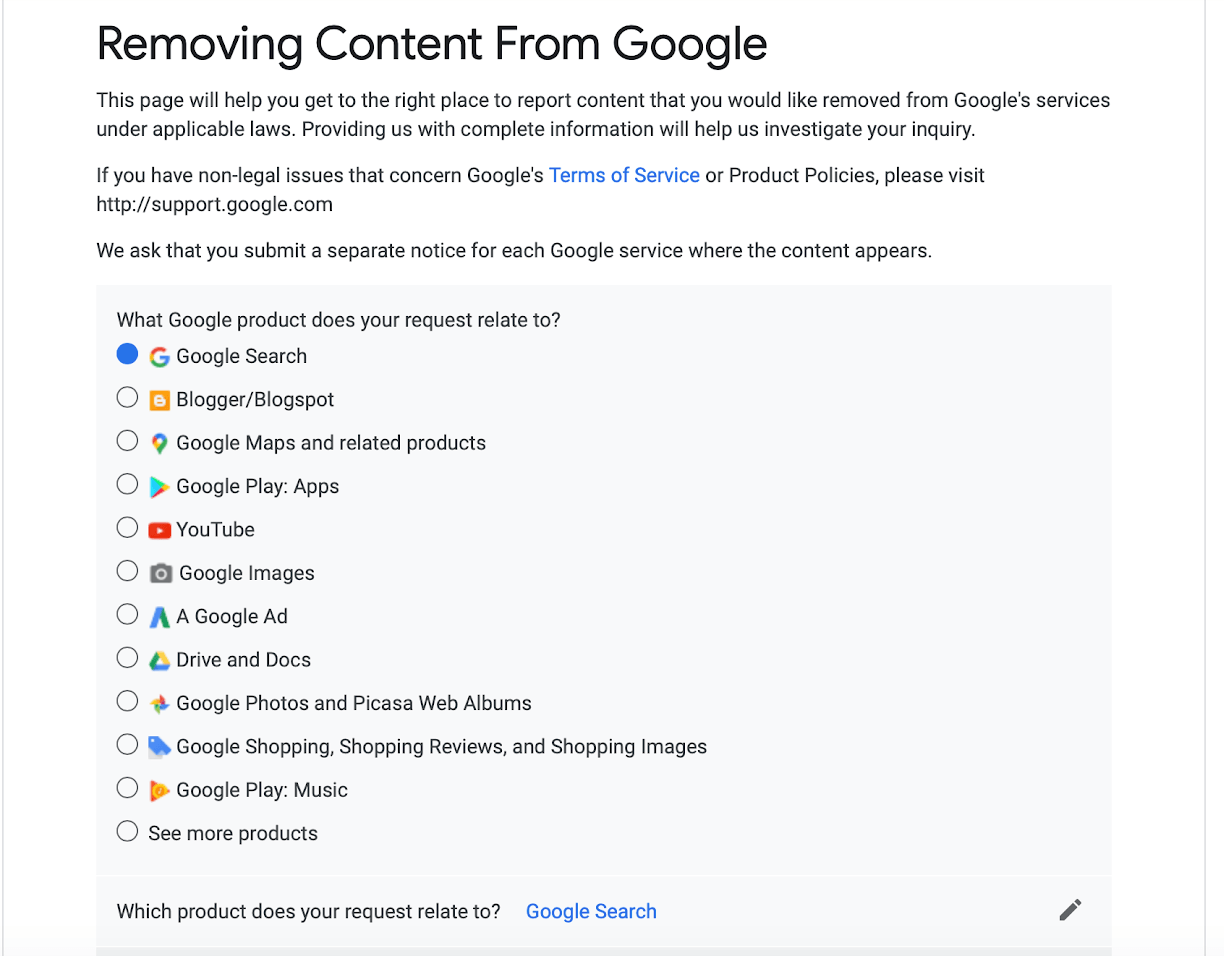
Note that you will have to submit a separate notice for each Google service where the content appears.
Step 2: Next, select “Other legal issue: report content for a legal reason not already listed.”
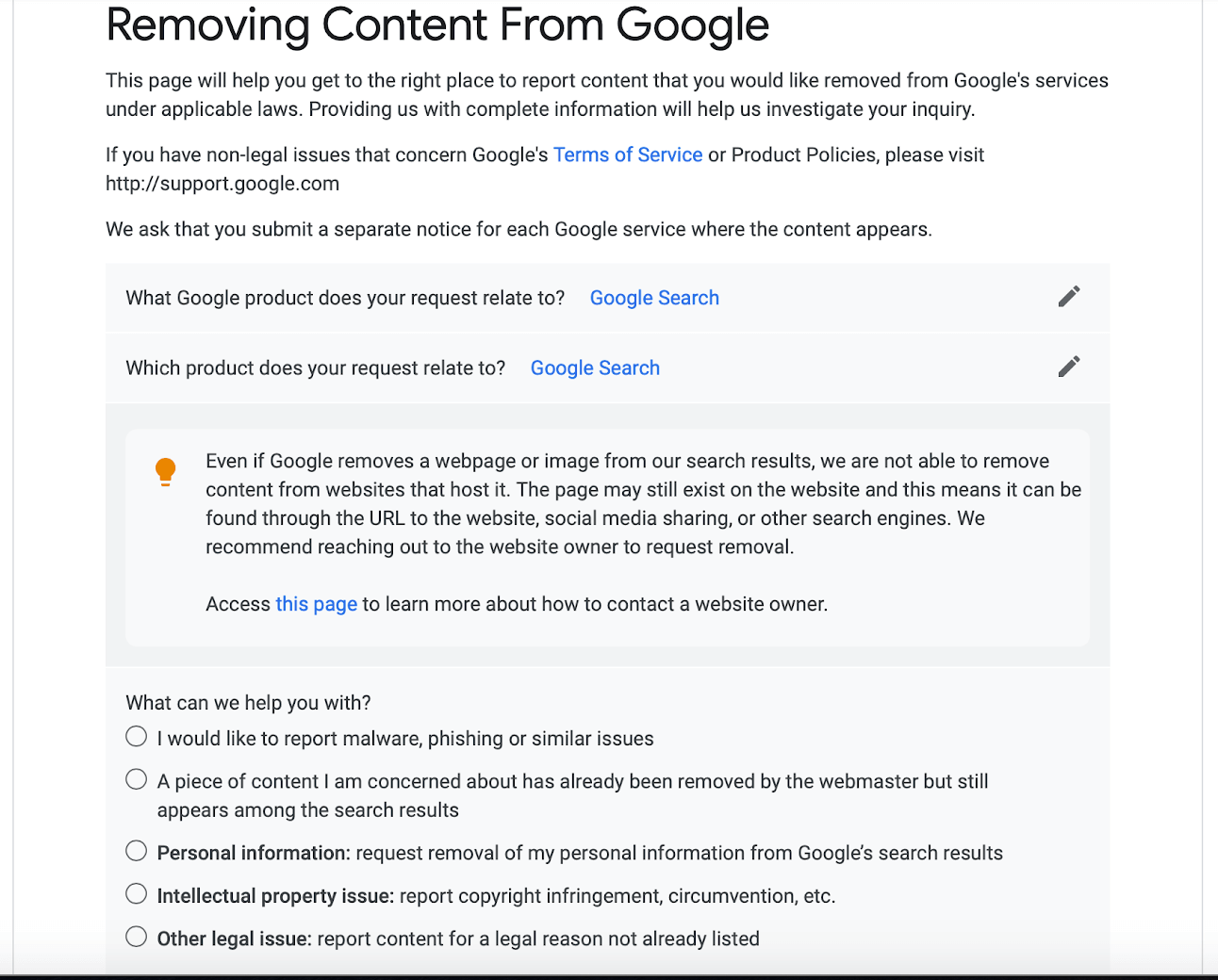
Step 3: Select “Court order: a court decision has determined that specific content is unlawful,” and then click “Create request.”
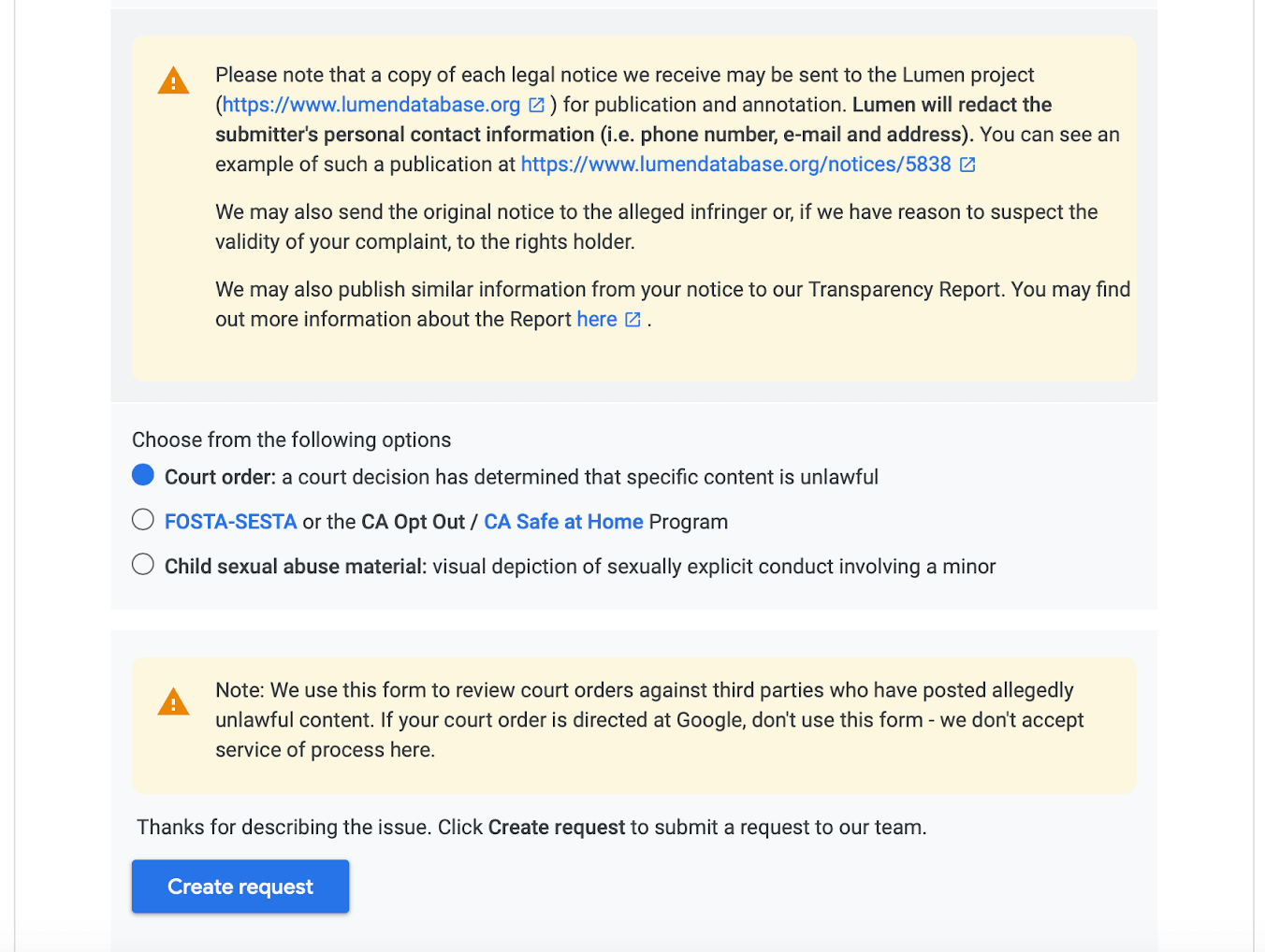
Step 4: You will then need to fill out your information, along with your client’s information and the content which you are seeking to remove. After you have filled out all required information, click “Submit.”
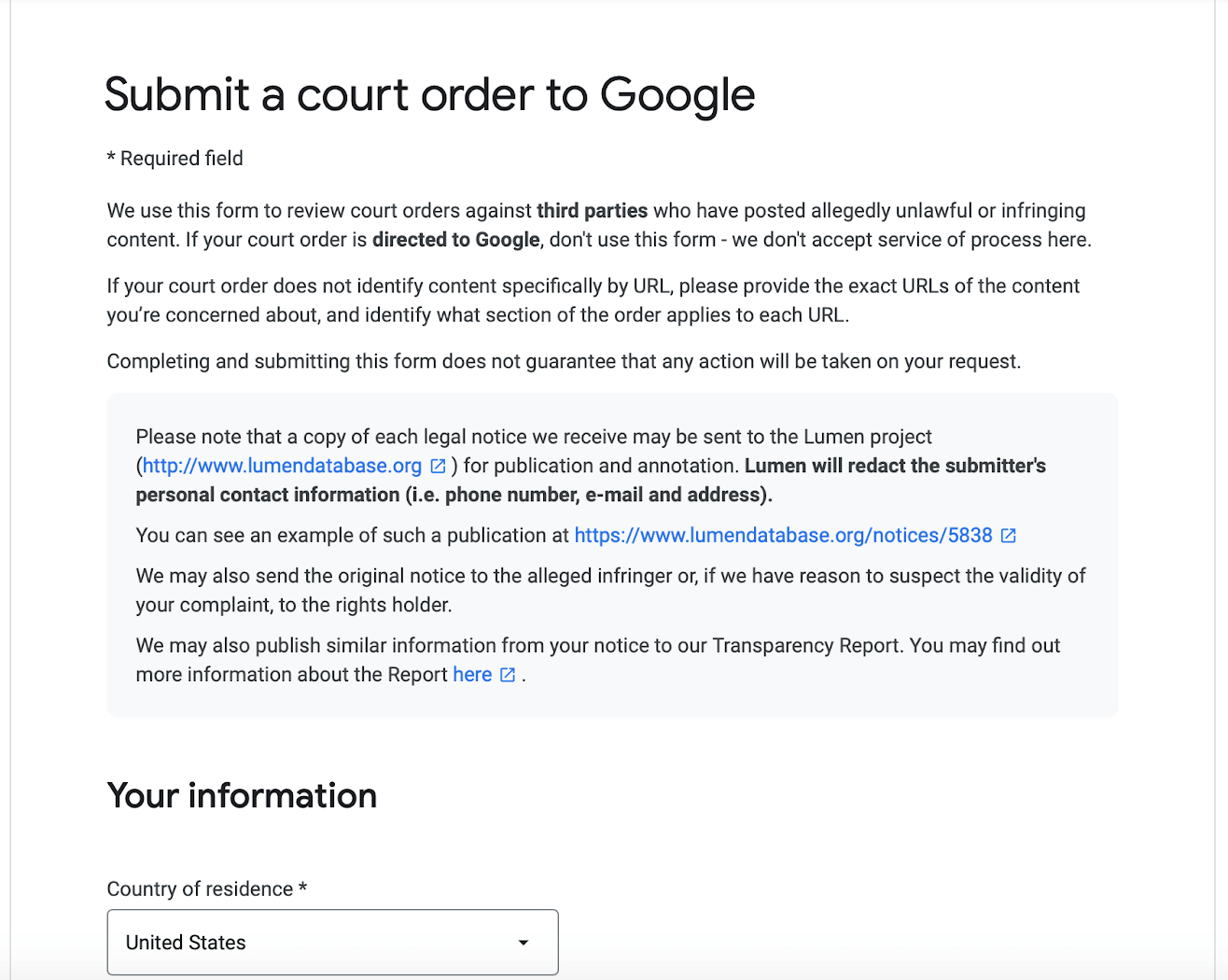
When using Google’s content removal submission form, we recommend being as descriptive and meticulous as possible.
Bing Content Removal Submission Form Walkthrough
Bing is a search engine owned and operated by Microsoft, so you will need to submit your court order at Microsoft – Report a Concern. When seeking a Bing content removal, you must notify them that you have:
- Contacted the website where the defamatory content is posted, and
- Presented them with the court order.
You must also submit evidence that the website has NOT acted on your request to remove the content.
Step 1: First, you will need to select, “I have a court order.”
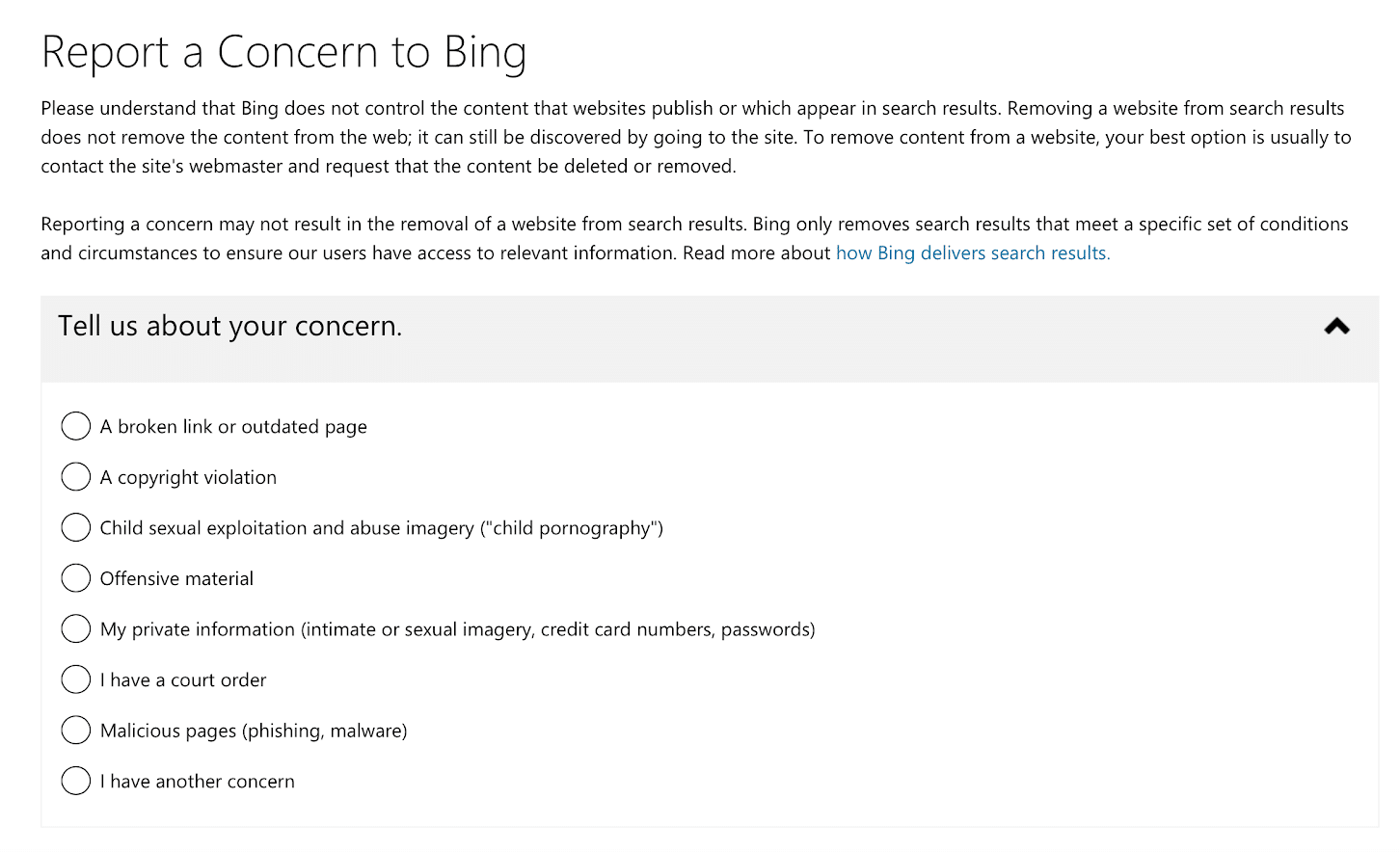 Step 2: Then select, “The court order is directed at someone else.”
Step 2: Then select, “The court order is directed at someone else.”
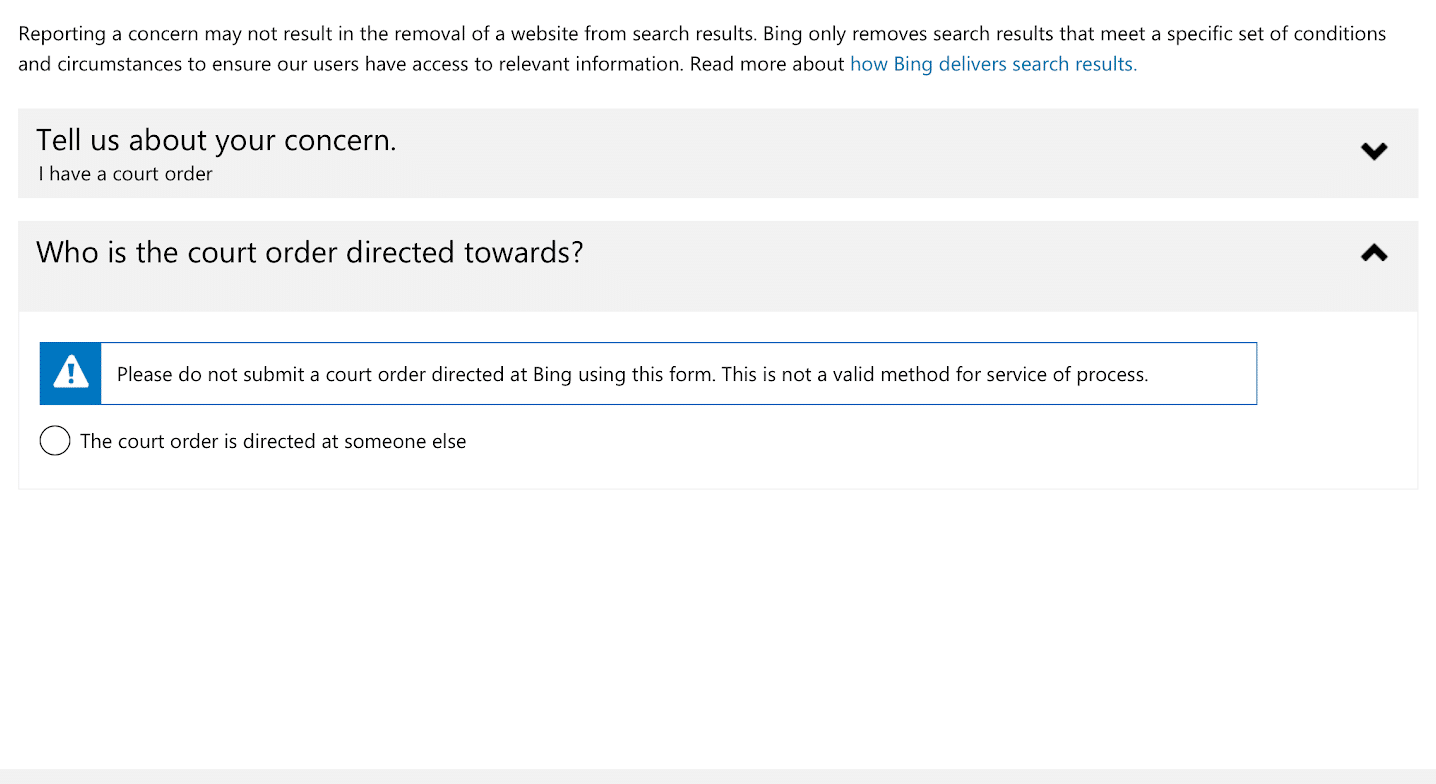
Step 3: Next, you will need to select, “Has the content already been removed from the hosting website?” and choose “No.”
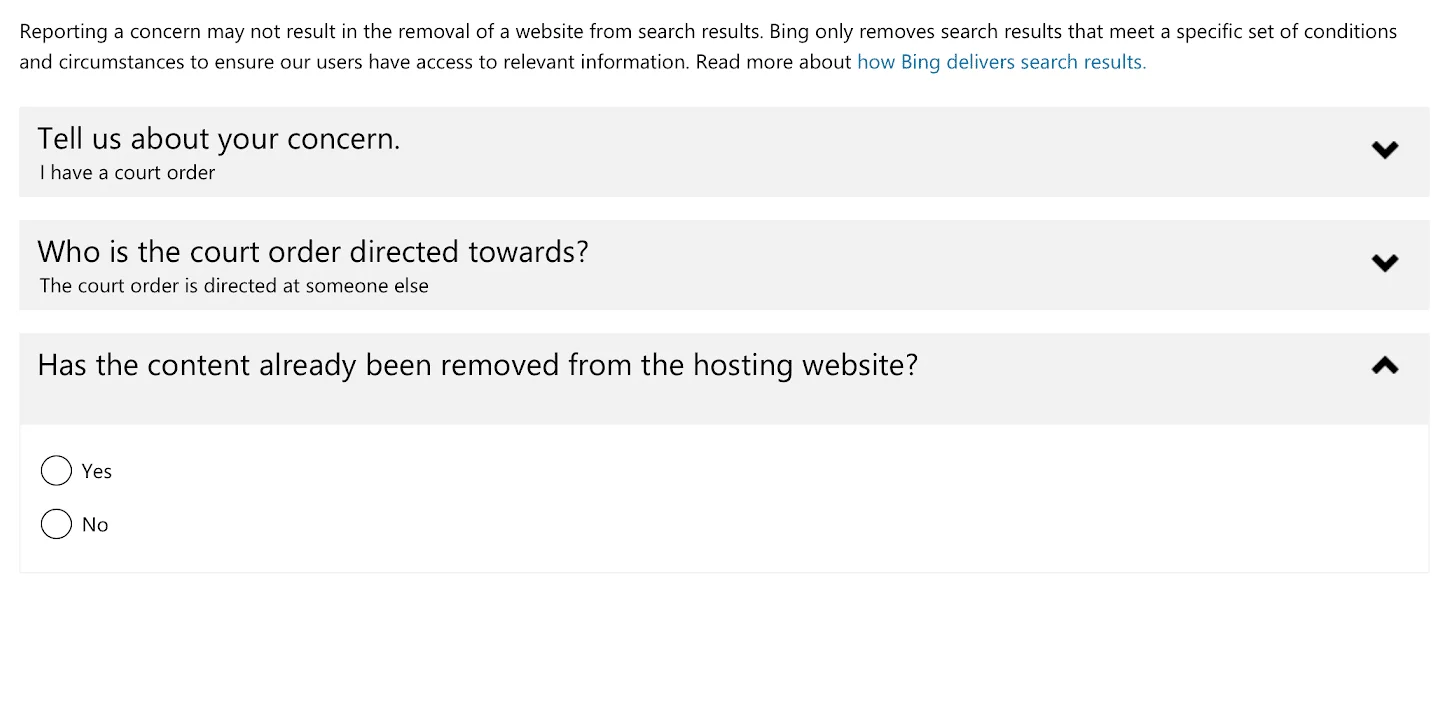
Step 4: Finally, fill out the required information and click “Submit.”
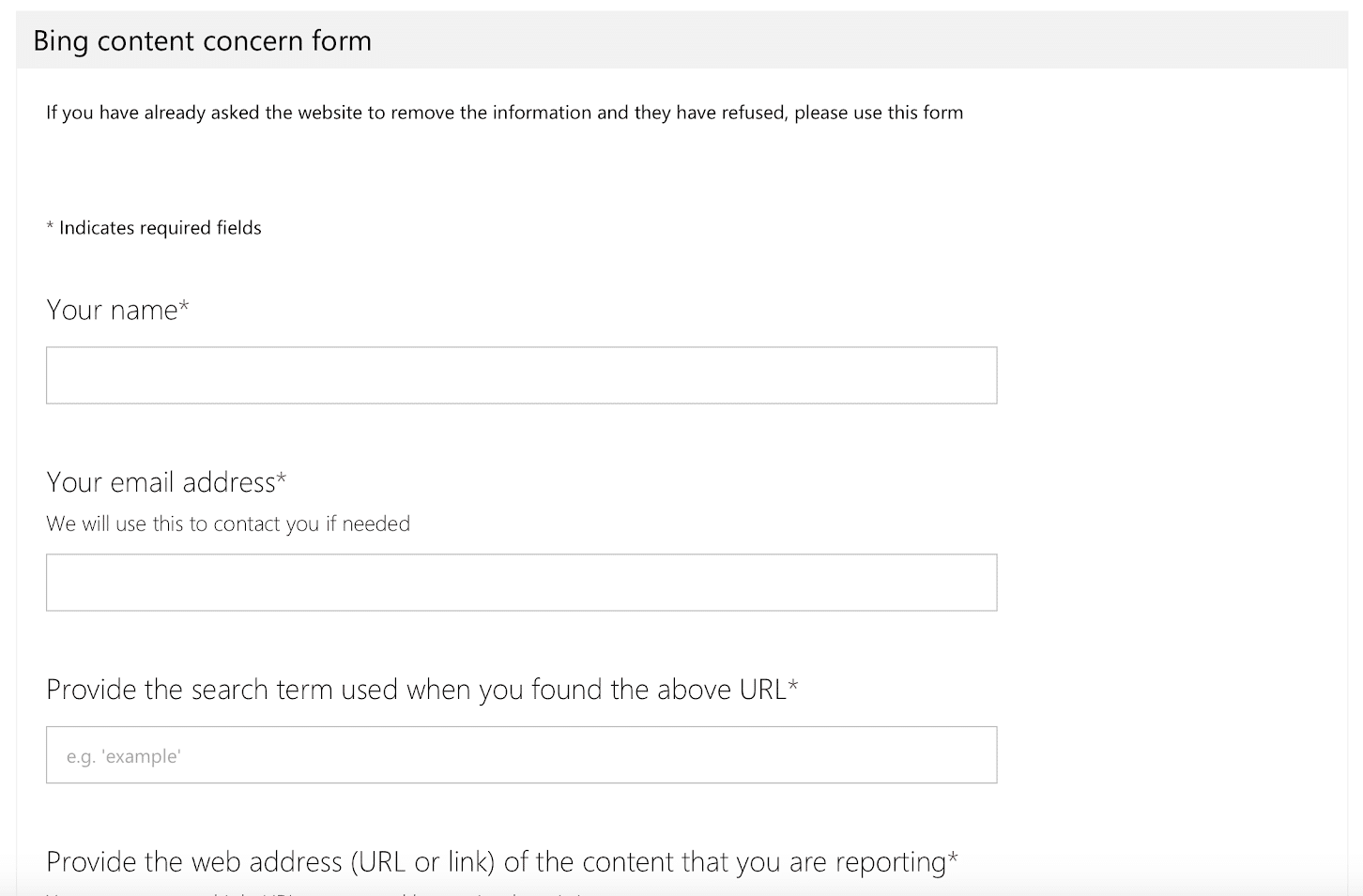
Make sure to enter your name and email address, along with the search terms used to find the URL in question. You also generally need to provide that the website in question or author of the content was sent a copy of the order and removal was already requested.
Alternatives to Obtaining a Court Order to Remove Content From the Internet
Seeking a court order to remove online content is not always right for you and your internet content issue. Whether it is because of the type of online content in question, the parties behind the defamatory content and attacks, or the fact that the content in question may not even give rise to an actionable legal claim, there are plenty of reasons why victims might seek alternative removal options.
Common alternatives to obtaining a court order to remove content from the internet are:
- Holding the webmaster and website liable;
- Author removal;
- Voluntary removal by the website via Terms of Service violations; and
- Google revenge porn submission.
Webmaster Liability
Despite the broad protections afforded by the Communications Decency Act (CDA) to internet service providers and websites, several notable exceptions can be employed to compel a website to remove content and hold them liable – even when the content was provided by a third party.
Intellectual Property Claims
Claims for copyright infringement, trademark infringement, and other intellectual property related claims such as the right of publicity do not enjoy CDA immunity.
Websites and service providers that receive proper notice of intellectual property violations, like copyright infringement or trademark infringement, should and (often) will promptly remove allegedly infringing materials.
Criminal Law Violations
Websites are not immune from the enforcement of state and federal criminal laws, especially laws relating to obscenity and the exploitation of children.
Communications Privacy Law
The Electronic Communications Privacy Act, Stored Communications Act, and related amendments or similar state laws are specifically excluded from CDA immunity.
Editing Content That Materially Alters the Meaning
If a website edits content created by a third-party and makes content that was otherwise not defamatory or illegal, defamatory, then a website will lose its immunity under the CDA.
Promissory Estoppel
A website can, by explicit contract or promise, waive or be estopped from asserting CDA immunity. Barnes v. Yahoo!, Inc.
Encouragement to Post Content
In Fair Housing Council of San Fernando Valley v. Roommates.com and FTC v. Accusearch, two federal appeals courts rejected website immunity under the CDA when a website “specifically encourages” the posting of illegal content by its users.
In 2013, the Southern District of Ohio found similar grounds for liability against TheDirty.com in Jones v. Dirty World Entm’t Recordings LLC.
Author Removal
Authors of information published on websites are not immune from liability under the CDA. If the identity of an author of a post can be ascertained, the author can be confronted about his or her statements and can sometimes be convinced, by the threat of legal action (ex. Sending a cease and desist letter) or otherwise, to remove the information voluntarily.
This is assuming that the website where the content is published allows the author to retract the content.
If necessary, legal action can be taken against the author and, in certain cases, an injunction can be obtained to force the author to remove the information from the internet.
Voluntary Removal by the Website Via Terms of Service Violations
Some websites, like RipoffReport.com, have policies that they will never remove information posted by their users under any circumstance. However, this is not always the case. Most websites and service providers have terms of use and policies that they expect users of the website to abide by when posting content.
For example, popular rating websites like Yelp, TripAdvisor, OpenTable, CitySearch and Avvo have clear terms of use on their sites that they do not tolerate users who post threats, harassment, hate speech, lewdness, displays of bigotry, and other information that is clearly irrelevant or conflicts with the interests and purposes of its website. Websites will often voluntarily remove information that violates their policies when appropriately alerted to the problem.
Google Revenge Porn Submissions
Revenge porn, also known as nonconsensual pornography, has become extremely prevalent online over the years. And, due to its extremely invasive and illegal nature, as of 2015, Google has acknowledged that they will honor requests from persons to remove nude or sexually explicit images without their consent from the Google search results.
In fact, all search engines will honor requests from persons to remove nude or sexually explicit images posted without their consent.
When filing your revenge porn takedown with Google, make sure to include your; name, country, email, URL where the content is live, sample URL of the Google search results, and screenshots of the offending content. You can find the link to remove nonconsensual pornography over at google’s page devoted to the subject “Remove non-consensual explicit or intimate personal images from Google“.
Video: Help! My Nudes Are on the Internet – How Do I Remove Them?

Minc Law Can Help You Obtain a Court Order to Remove Online Content
Court orders are useful tools in getting damaging and defamatory online content removed. The posters of negative content must follow court orders or face being held in contempt. Even in trickier situations, when you run into an uncooperative defendant or platform, alternative methods exist to get the content removed.
Sometimes, a court order may be the only way to get content removed from the internet.
★★★★★“I had a great experience with Minc Law and especially with the attorney that was on my case Andrew Stebbins. He was very thorough and was able to have all the links that contained my name removed. I would highly recommend Minc Law and Andrew specifically if you are looking for a defamation lawyer to help get your reputation back.”Rich Vild, December 27, 2020
If you determine that you need a court order (or would like to know what your options are), reach out to our experienced content removal attorneys. We offer free, no-obligation consultations with our intake team to help you determine the best course of action for your situation.
Contact us today to schedule your free, initial no-obligation Internet consultation with an intake specialist by calling us at (216) 373-7706, or by scheduling a meeting online.
Get Your Free Case Review
Fill out the form below, and our team will review your information to discuss the best options for your situation.
This page has been peer-reviewed, fact-checked, and edited by qualified attorneys to ensure substantive accuracy and coverage.




